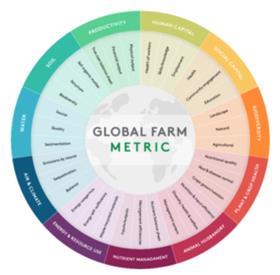
A coalition of UK farmers, politicians and retailers have backed an impact measurement model designed to make food production more sustainable.
The Global Farm Metric is set to become a new standard by which farmers and supermarkets measure and manage the environmental and social impact of food production, and it has the support of the National Farmers’ Union, Defra and Britain’s big-four supermarkets.
The new tool resembles an existing model called the Sustainability Flower developed by Dutch organics distributor Eosta in 2008-2009. It originatesfrom the same international organic think tank, the Belbis Desert Club.
What's special about the British model isthat non-organic farmer organisations and supermarkets are nowalso embracing it. In collaboration with the NFU, the model has been tested at various English farms. Going forward, the focus is on making the Global Farm Metric an international standard.
“We are certain that we can reach agreement about a standard farmers worldwide can use,” said Patrick Holden, founder of the Sustainable Food Trust, which was closely involved in the development of the Sustainability Flower.
Speaking on BBC radio last month, Prince Charles said he considers the Global Farm Metric a means to harness the power of themarketfor sustainability.
“Only by harnessing the power of the market to help move towards net-zero emissions and reinstate the loss of biodiversity will we be able to avert a catastrophic ecological breakdown of our planetary support systems,” he said on 29 April when the metric was launched.
“The key to all this lies in measurement.With a harmonised global framework of measurement in place we might finally have the potential to enable a global renaissance of truly sustainable agriculture and food production.”
The Sustainable Food Trust launched the measurement model during aTEDx broadcastentitled Measuring Sustainability, with the Prince of Wales and business leaders from British agriculture and retail present.
During the event, NFU president Minette Batters said: “It has been fascinating and rewarding to work together across all sectors on a harmonised set of sustainability metrics.
“Farmers can be part of the solution to climate change, but for this to happen it is really important that we own the evidence base for what we are doing on farm. This will allow us to see what we can change and where we can lead globally.”
Eosta MD Volkert Engelsman added: “It’s good to see that the Brexit has proven to be a blessing in disguise for the British agricultural and food sector.
“Now that they are freed of the European lobby for artificial fertiliser, concentrate and pesticides, they areready to deploy a holistic sustainability model rooted in the mental legacy of biodynamic agriculture.”
Practical implementation of the metric in the UK will follow a procedure similar to the one Eosta has been using with its organic growers.
“Each farm would have an annual sustainability audit,” explained Holden. “This involves the measurement of soil organic matter, water quality, greenhouse gas emissions, energy and resources use, biodiversity, data on crop management, and of course social and cultural impact.
“The data is combined to produce a score which canbe used by supermarkts and food companies;by governments to broker new international agreements for trade; and togive consumers the power to identify sustainable products.”
He added: “The power of this model is that we could reward famers for delivering public benefits, for building soil carbon, for increasing their biodiversity. I don’t think there’s a farmer in the world who wouldn’t want to be part of this.”
According to Eosa, both the Global Farm Metric and Sustainability Flower look beyond short-term profits to the impact production has on human beings and the planet.
Ecology is subdivided into soil (including mineral resources), biodiversity (plants and animals), water, and climate (including energy). The human domain is divided into three aspects: individual development, social development and economic development. In financial terms, impact covers four types of capital: ecological, human, social and economic.
So-called True Cost Accounting can be used to convert the impact measurements into monetary amounts.
The differences between Eosta’s Sustainability Flower (seven petals) and the Global Farm Metric (12 segments) are in the details. For example, certain segments such as ‘biodiversity’ and ‘climate/energy’ have been further itemised in the English model.



